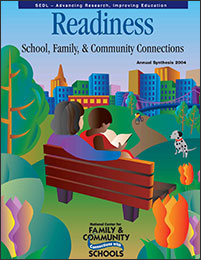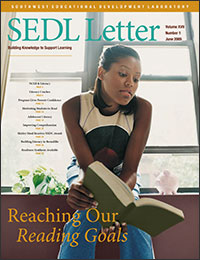Early Experience in School Sets the Stage for Later School Success
Children's earliest experiences in school often set the pattern for later academic success, according to the latest Southwest Educational Development Laboratory (SEDL) research synthesis.
"Young children enter kindergarten with a range of cognitive and social skills that contribute to their achievement during kindergarten," says Catherine Jordan, director of SEDL's National Center for Family & Community Connections with Schools. "According to our new synthesis of research studies related to school readiness, children who get off to a good start in kindergarten tend to maintain that advantage as they progress through school."

Readiness: School, Family, & Community Connections is available online.
Jordan explains, "This finding points out the importance of readiness as a strategy for helping to close the achievement gap. In other words, the research suggests that the achievement gap starts early and persists. Our challenge is to find strategies that can help all children to experience that critical early success."
The research synthesis, Readiness: School, Family, & Community Connections, was written by SEDL program associate Martha Boethel and published in December. The report synthesizes information from 48 research studies and literature reviews—all published since 1998 and including correlational, experimental, and quasi-experimental studies—to answer three questions:
- What is known about differences in children's skills and performance at kindergarten entry and the contextual factors associated with those differences?
- What is known about early childhood or preschool interventions that include family or community components?
- What is known about children's transition to kindergarten, including transition beliefs and practices and patterns of family-school interactions?
The studies indicate that a variety of factors contribute to children's readiness for kindergarten, according to Jordan. "For example, the home environment is strongly associated with children's early skills and abilities," she says. "Though we still have a lot to learn about what works, there is evidence that early interventions not only can help children directly, they can also help families develop more effective supports for their young children's learning."
She notes, "Many of these findings aren't new, but they confirm previous research and lend support to the work of the National Center and other organizations focused on strengthening home and school connections and educating families and communities about their roles in their children's education. Other findings in the synthesis give us insight into needs for future research—we still have a lot to learn about the relationships among children, schools, families, and communities and how they affect young children's success in school."
Next Article: Credits

